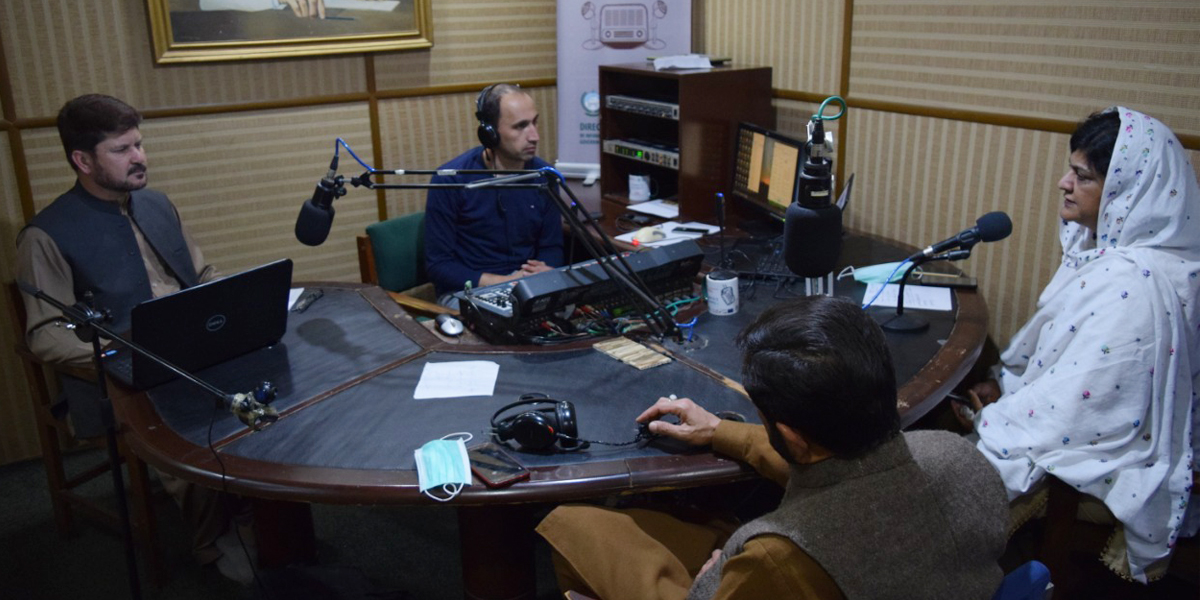The 144th radio program as part of the Center for Research and Security Studies’ (CRSS) counter-radicalization initiative Ulasi Taroon (Social Cohesion) aired on the subject theme.
The first guest on show, Ms. Shagufta Gul, Project Consultant and Lead Trainer noted that out of its belief in the potential of youth and as part of its mandate for the promotion of democracy, the Center for Research & Security Studies (CRSS) is consciously sensitizing the young on the core constitutional values for social cohesion and cultivating their leadership potential. Ulasi Taroon is also one of the manifestations of this belief, a youth leadership development and counter-radicalization initiative running since 2017 promoting dialogue for peaceful conflict resolution, civic education and participation, and responsible citizenship. The programme has been able to successfully achieve its objectives with over 30 public and private sector universities on board and over 1000 alumni.
During the protracted period of pandemic, Ulasi Taroon switched to online conduits of communication to continue to generate traction around its core themes and deliberate how citizenry can cope with crises without comprising their much-needed cohesion.
As part of Ulasi Taroon’s strategic communication module embedded in media advocacy, radio has been utilized as a tool of communication on the project’s core themes and used to massively outreach audiences across the entire province including tribal areas, while undeterred by pandemic. The cohort of Ulasi Taroon Alumni including over 1000 students from different universities across KP serves a real asset of the initiative manifest in their resolve and actions for social cohesion.

The second guest on show, Mr. Malik Ikram Khan, program transcriber, noted that Ulasi Taroon is a reminder that nations cannot develop without responsible citizenship; where citizens realize what it really means to be a party to the social contract with the state and fulfil their duties while expecting their fundamental human rights from the state. The message of Ulasi Taroon is loud and clear; be the change you expect.
The third guest on show, Mr. Naseem Khan, Technical Coordinator, Ulasi Taroon, added that as a member of team Ulasi Taroon, it was such a fulfilling experience to promote the values of peace and cohesion; ideas which can change the fate of nations.
The fourth guest in the phone, Mr. Mustafa Malik, Team Lead for Ulasi Taroon, said that the way our youth leaders received the initiative and believed in the core values it underscores turned Ulasi Taroon into more of a peace movement. The young people must believe that there is light at the end of the tunnel and keep taking steps in the right direction no matter how small. The purpose of Ulasi Taroon is to discuss how luminous is the light cohesion, its virtues and the significance of small but determined steps to get to the bright and cohesive future.
The fifth guest on show, Ms. Mahnoor, Ulasi Taroon Alumna and a student of Institute of Management Sciences, Peshawar, said that the Ulasi Taroon offers a great platform to youth leaders to interact with their counterpart students from diverse backgrounds. The interaction of diverse perspectives during such dialogue settings generates new knowledge and fosters mutual understanding key to social cohesion and conflict resolution. The best we can do for youth leadership development is to give them a practical exposure that exposes them to different ideas and new cultures, as an intervention to develop empathetic future leaders.
About Ulasi Taroon
Ulasi Taroon is a counter radicalization initiative of Center for Research and Security Studies that aims to address the radicalization challenges, extremist ideologies and foster social cohesion through a discourse anchored in the core constitutional values which are fundamentally essential prerequisites for social peace and harmony. The endeavor aims to cultivate and sensitize the people of KP in the core values in the Pakistani constitution and our social contract. It’s an attempt to highlight the criticality of abiding by these ideals – such as adherence to rule of law, primacy and sanctity of constitution, equal citizenry, responsible citizenship, respect for fundamental human rights, tolerance for diversity and different opinions, inclusive democracy and good governance – as a measure of strengthening social cohesion and promoting peaceful co-existence.

